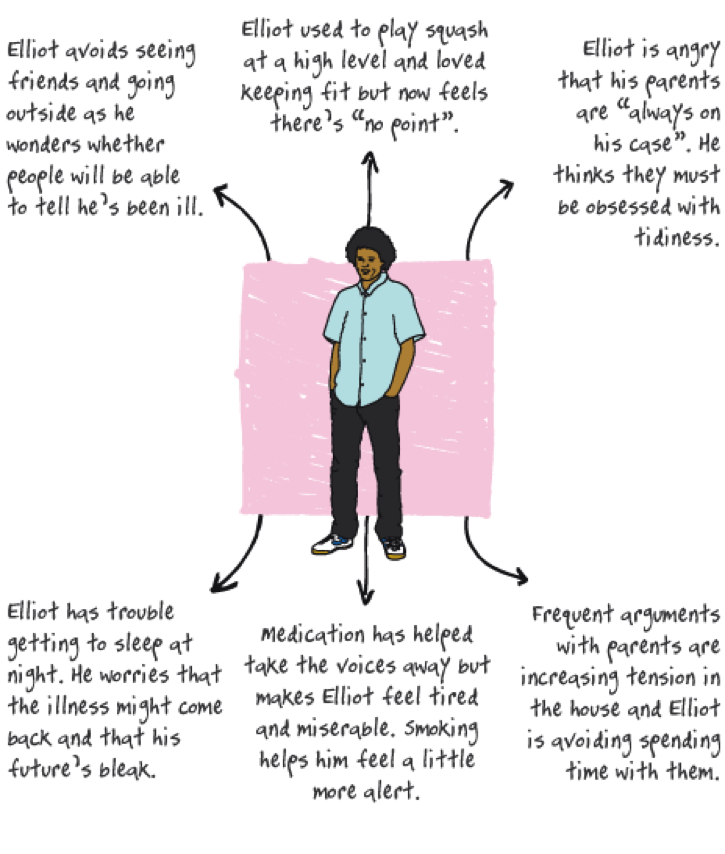
A Success Story
Elliot became unwell with psychosis when he was in his first year at university and had to return home.
 He has been taking antipsychotic medication for around a year and says that the voices that he was hearing have gone. His dad is worried however, that he has no routine and no purpose in life. Elliot usually stays in bed until lunchtime when he will come downstairs and make himself some food.
He has been taking antipsychotic medication for around a year and says that the voices that he was hearing have gone. His dad is worried however, that he has no routine and no purpose in life. Elliot usually stays in bed until lunchtime when he will come downstairs and make himself some food.
Elliot smokes in his room (which is against house rules). He throws cigarette ends out of his bedroom window into the garden. His parents have often returned from work in the evening and tried to get him to clean up the mess in the kitchen and the garden but this usually ends up in arguments.
Step 1 – Making a Difference
Elliot’s mother and father spoke to Elliot’s care coordinator and his psychiatrist. They described how Elliot’s recovery seemed to have stalled and how worried they were about his lack of progress. They had to be very assertive, but it was agreed that Elliot would be offered extra help from a Support Worker and a Clinical Psychologist.
Step 2 – Understanding the Problems
Everyone put their heads together and thought of some of the reasons why Elliot seemed to be struggling to get on with his life.
 Step 3 – Implementing a Plan
Step 3 – Implementing a Plan
Elliot, Mum and Dad agreed a plan with the Early Intervention Team.
Elliot had a meeting with the Psychiatrist to discuss how he was feeling and how the medication was affecting him. Elliot chose not to change his medication as he was worried the voices might come back. He was advised to take it in a single dose in the early evening, however, so that the worst of the side effects were beginning to pass by morning. The Psychiatrist wondered whether Elliot might be depressed and it was agreed that Psychological Therapy might be helpful.
The Support Worker had a psychotic illness 3 years previously and had needed help from mental health services. Elliot felt more relaxed with him and he enjoyed going for long walks. After a couple of months the Support Worker took Elliot along to a football team that he runs with other service users.
Progress
Although he still stayed in bed on most days Elliot began to look forward to the walks and the football group. He talked to the other service users at the group and found out that most of them had enrolled in college courses or were getting some work experience as volunteers.
The support worker asked Elliot if he felt like coming along to the sports centre and giving some of the other service users some informal squash coaching. This gave Elliot and the Clinical Psychologist the chance to test out whether it was true that he was ‘useless’.
Elliot’s Care Co-ordinator started to visit him when his parents were at home. They discussed the reasons why Elliot was finding it so difficult to get moving, especially how difficulties with motivation can be a big part of psychotic illness.
The Care Co-ordinator helped Mum and Dad think of new ways of dealing with the problems. The arguments about tidiness had made them all feel more stressed and they decided to tolerate the mess for now and instead to focus more on helping Elliot to do the things that he was really interested in.
Elliot started a part-time access course in sports science at the local college. Mum was pleased and gave him a lift to college in the car.
 At first Dad was disappointed that Elliot was on a ‘non-academic’ course, but he really wanted to support Elliot and recognised it was a positive step forward. He and Elliot started going jogging in the evening as they both really wanted to lose weight.
At first Dad was disappointed that Elliot was on a ‘non-academic’ course, but he really wanted to support Elliot and recognised it was a positive step forward. He and Elliot started going jogging in the evening as they both really wanted to lose weight.
Nothing seemed to help with the untidiness. It’s still a problem for Mum and Dad. Elliot leaves his dirty clothes on the bathroom floor, doesn’t tidy up after himself in the kitchen and there are often dirty plates in his bedroom.
Mum and Dad found out by chance about Direct Payments. Elliot was awarded some money from the local social care budget to purchase care for himself and used it to pay a friend to act as a ‘Personal Assistant’ for 2 hours a week. They use the time to tidy his bedroom, sort his laundry out, deal with correspondence and listen to loud music. The house is still untidy sometimes but Mum and Dad can just about deal with this.
Outcome
Elliot has stopped throwing cigarette ends out of the window. Or at least his Mum and Dad think he has. He makes sure they land in the guttering on the porch roof. They have an agreement: if the week passes without finding a cigarette end in the garden, on Friday night they order a takeaway from Elliot’s favourite restaurant.
Elliot continues to struggle with negative symptoms. However, the Care Co-ordinator has put together a care plan with a mixture of help and activities so that Elliot can enjoy himself, mix with other people, and look forward to the future. Mum and Dad both feel sad sometimes that Elliot has not been “cured” but have learned to recognise the efforts that he puts into his recovery and making a life for himself.


